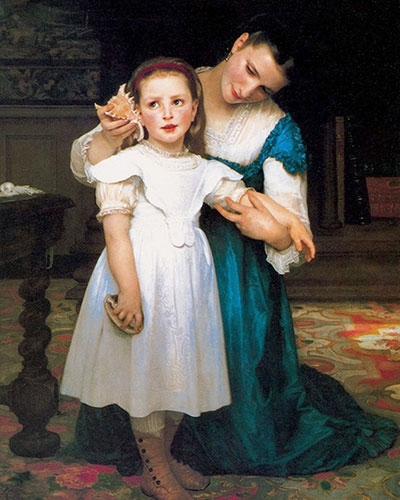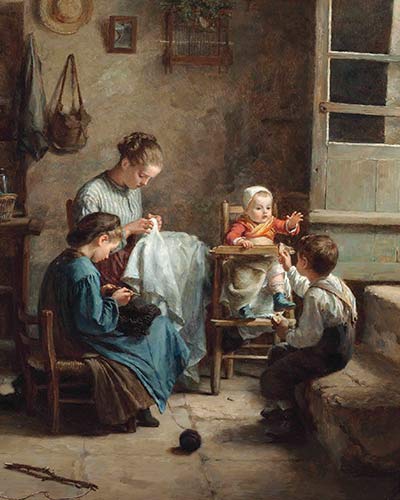Karen has a great post up on Raising a Dreamer. The topic of raising a dreamer is near and dear to my heart so her post resonated with me.
Sandra left an outstanding comment on Karen’s post and I’m putting it here because I don’t ever want to lose this. She has expressed perfectly what I have come to understand and believe over the past year or so in finally really beginning to understand my child and throw off the conventional “wisdom” poured forth by so many parents, pastors, teachers, etc. who obviously have never dealt with a dreamer child in real life (or else have crushed the very life out of the child).
Sandra wrote (bold mine):
I am homeschooling a 12 yo daughter with learning differences. Recently we have begun seeking outside assistance for the LD and running into brick walls. The experience has really highlighted for me how narrowly we allow our children scope for success. In both Christian and non-Christian society, children are valued if they are obedient, rarely or never questioning adult wisdom, quick at schooly sorts of academic tasks (multiplication tables, spelling tests), and infinitely interruptable for whatever next thing a grown up wants done right now but able to stay on task without distraction when that is convenient for us. The irony is that in both Christian and non-Christian society, the people who we most admire and consider successful rarely do anything like what we expect of children: they are innovative, creative, willing to rock boats, think for themselves, follow their inspiration (or God’s leading, if that is the phrase preferred) even when the conventional wisdom is discouraging. How do we expect our children to grow up to be these people if we never let them have the learning experiences in childhood in which to find and practices these skills?
This is EXACTLY the conclusion I have come to in raising Caroline. I have thought and wrestled through every part of what she wrote there and know exactly what she is talking about right down to the idea that parents can disrupt a child whenever they want and expect immediate, cheerful obedience no matter what the child was engaged in but then fear the wrath of God if the child should happen to assert himself or herself and his/her wishes.
Dreamers and the Edison Trait
I’ve been starting to work through The Edison Trait: Saving the Spirit of Your Nonconforming Child (now called Dreamers, Discoverers & Dynamos: How to Help the Child Who Is Bright, Bored and Having Problems in School) and have also found it helpful in thinking about how Caroline thinks and works. I’ll probably share some quotes in the future.
We were recently visiting my parents and Caroline was poking along at doing something in her own way and on her own timetable that was significantly slower than what I would have chosen. But I chose to give her the space and time to do what she was doing without trying to hurry her along. My mom made a comment about my ability to be patient with her.
In thinking about that comment I’ve come to realize that it took God twenty years to prepare me for mothering this child. I prayed to be a patient person and it took Him twenty years to answer that prayer and give me the ability to patiently wait for a child who lives in her own world with her own agenda and her own timetable. At the same time, she is smart as a whip and it is going to take everything God can give me to bring her up and prepare her for whatever purposes God has for her.

















YES! this is my Ellie too – and JUST the reminder that I need right now.
Sally Clarkston recently did a post entitled First time obedience, really? (now archived in WayBack Machine) that currently has over 130 comments on it. Lots of good food for thought over there. 🙂
That’s a great comment, I will have to copy that down somewhere.
We want children to act a certain way because it makes OUR lives easier, whether it’s in a traditional school or even in a homeschool environment.
Sallie, I’ll have to hop over to ThatMom’s post, but let me just say that I think raising a dreamer probably ought to be a GOAL, whether the child shows the inclination or not! I say this only because a lot of the traits of a “nonconforming” child (when they are not truly signs of rebellion) are really signs of liberty, and our goal is to raise free people, right?
If you don’t mind, I’ll give you a little quote from today’s (at my blog, anyhow) chapter of Ten Ways to Destroy the Imagination of Your Child:
Beautiful, no?
Sallie, I love this. Recently, my husband and I joined a home fellowship for parents of kids under 2. We have been reading through a parenting book and talking about parenting in general. We’ve noticed how different we are as parents from the others – on the outside it probably looks like we’re lazy, but really we want to let her explore in her own way and learn things in her own time. I think through having a daughter whose motor skills are delayed, God has taught us a lot about patience and also about not being concerned about what everyone else’s kids are doing. (The second one is something I especially struggle with.)
Yes, yes, yes. It has taken me 10 years of motherhood to learn this. And having a special needs child and finally having a child diagnosed with aspergers as well.
I love Sally Clarkson’s newest post: http://www.itakejoy.com/discipleship-relationships-take-a-lot-of-time/
Brandy – I hear what you are saying and I agree that all children should be given the opportunity to “dream” and think outside the box, giving them to freedom to explore. It is a good goal to raise children in the joy of liberty.
I think where dreamers are different is that they don’t need to be encouraged to be that way. They are naturally wired that way and don’t function any other way. They don’t need to be encouraged to be imaginative or creative. They just are to such an extent that sometimes reality and imagination are both just as real to the dreamer as the other.
I think the challenge is going to be discerning how much freedom to give a dreamer and when to say – no, you have to do this because you just have to do so. You have to learn your multiplication facts, you have to learn how to write a proper sentence, etc. I want Caroline to be well-educated so she has options but I have to figure out how to accomplish those “necessary” things for her to function well culturally while giving her ample freedom to do all the other things that make her who God made her to be and fill her life with purpose because of how she is wired.
I hope that makes sense. It’s late and I’m kind of tired! 🙂
Understood. 🙂
Charlotte Mason spends some time talking about the education of geniuses in Vol. V: Habit Formation. When dreaming is coupled with intellectual quickness, they used to call it genius. 🙂 She seemed to generally support giving them more freedom than the average student, and part of that was because they tended to reject a lot that wasn’t on their minds already. Of course, she also pointed out that some of them ended up regretting their “poor” education because they were allowed to be more self-directed than the average child. It’s a hard balance to strike, I agree.
I think what I meant before, by the way, is that whereas moderns tend to criticize the dreamer for nonconformity, we’d do better to see it as an ideal, and strive for it with the children who are so prone to slavish hoop-jumping because everyone praises them for it.
One of my girls has some strong dreamer tendencies. I learned so much about her from the Strong Willed Child or Dreamer book and am going to request The Edison Project from the library. Thanks, Sallie!
I’m not sure if my second-born is a Dreamer, but so much of what you’re writing about speaks to me — the societal expectation for children to develop uniformly, that “schooly” aptitude equates with brightness or success, and the expectation that we can interrupt children at will yet also expect them to stay on task when we command (when you think about it, isn’t that kind of crazy?!).
I applaud you for working hard to be patient and nurture your child in the way that’s right for her. It’s not always easy, especially when others have different expectations.
Looking back as he approaches his 19th birthday, it seems so ridiculous that my bright but late bloomer son was thought to be in terrible academic trouble because he didn’t know all his letter sounds in Kindergarten and didn’t know all his multiplication tables in 2nd grade. (Since he followed a sister who developed these skills quite early, I didn’t know better for a long time.) Around 4th grade we realized we were approaching him all wrong, pulled him out of public school, put him in a small Montessori school back one grade year (he was totally happy because our neighbor was in the class), then homeschooled him for three years of middle school. Sometimes the homeschooling in particular was Really Hard — so much patience required for someone so unlike me!
But I’m now on the other end — he is about to turn 19, has been accepted to two colleges thus far, and will be going off to study computer science and perhaps forestry in the fall. When he went to high school, he was ready, and although he wasn’t the academic star his sister was, I have recently wondered if maybe he had the better high school experience, enjoying debate, volleyball, and a busy social life with nice kids. I’m not sure he’d be happy and successful now if we had continued to try to squish him into societal expectations when he was younger (i.e., to be able to do the “on task/able to be interrupted” thing in a classroom of 36 in public school – this long note is really very abbreviated, grin, there is much more I could say!). Why were we so worried about how he measured up to other children at a young age and whether he could sit still in his chair all morning? It seems absurd now that he’s emerging into adulthood with a bright future ahead.
I’m sharing this just to encourage you to hang in there, I really believe you’re on the right track, working hard to treat your daughter as an individual with unique needs. It works.
Best wishes,
Laura
Oh my goodness, just finding this blows me away. I just found a copy of “Strong Willed Child or Dreamer?” yesterday and I’ve read about halfway through it already. That’s what led me here.
I have been criticized by so many for my “unconventional” ways of raising my daughters– my youngest is also 12– and it’s so good to see I’m not the only one raising her this way. She is a dreamer, as is my 19 year old. (And I’ve also learned a lot about myself, also a dreamer.:-) )
People have always thought my 19 year old is just some sort of angel or something, because she is totally focused on completing college and succeeding at her current job, and not interested in drugs, drinking, partying or sleeping around, but I always like to think that I had something to do with it, too. 😉 So I kind of “got it” before, but the book is already helping me find better ways of disciplining my 12 year old with some problems I didn’t have with my older one.
I see other dreamer children, who were forced to conform, grow up miserably and then totally go into a tailspin once they left home and started college and I’m determined that I won’t let that happen to mine. Society these days seems so full of children that are just willing to follow the herd and not think for themselves. That can be a dangerous mentality, politically, intellectually and religiously and I applaud each and every one of you who had decided that is not going to be your child.
Joy